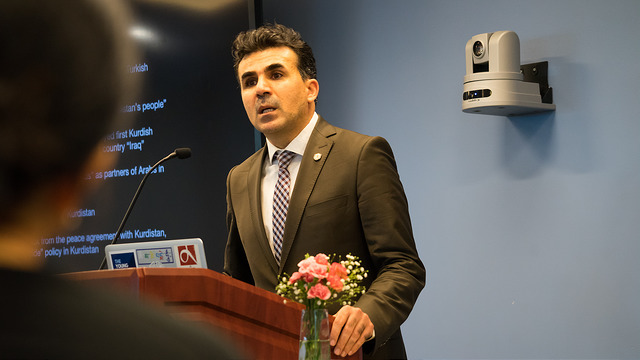
The lecture began with Dr. Bayar’s introduction of a brief timeline of the emergence of the Kurds, Kurdistan movement, and Kurdistan region of Iraq, and a description of the United States’ developing role since 1990 in becoming a dynamic tool in the formation of Kurdish politics in the region. Dr. Bayar focuses his discussion on the United States in terms of the evolution of its involvement in Kurdish politics and the role of the United States in the middle east, particularly from the point of view of Kurdistan. He describes how initially in 1991, the United States sought an alliance with Kurdistan through the United Nations Council of Security in order to “provide comfort operation” and create a “safe haven” for Kurdish people in Southern Kurdistan and the North of Iraq as Saddam attempted an attack on Kurds after their attempted uprising against him. The United States at first remained hesitant to become directly involved in Kurdish politics and relegated Kurdistan’s political affairs to Turkey which resulted in a kind of civil war in the region. However, in 1998 the United States’ return to their original position in Kurdistan resulted in their ability to bring the Kurdistan Democratic Party and the Patriotic Union of Kurdistan, two main Kurdish parties, together under the Peace agreement of Washington. Dr. Bayar describes the United States’ interference in this case as cementing the Kurds’ direct alliance with the United States instead of Turkey and forming one of the United States’ strongest alliances in the middle east. As a result, in 2001, after the 9/11 attacks on the United States, Kurdistan became a prominent voice for the United States in the region while declaring an official public statement by Kurdistan regional government in support of the United States’ ‘War on Terror’.
Dr. Bayar emphasizes a continued effort of Kurdish support for United States’ policies as countered by an absence of reciprocation from the United States in aiding the Kurdish Regional Government (KRG) to achieve any of their desired constitutional rights within Iraq. He describes this process as leading to the gradual disintegration of one of the United States’ most prominent political footholds in the region. In 2015, with the aid of ISIS, Kurdistan pursued a referendum. In 2017, with 93% of votes cast in favor of independence, the KRG claimed they would begin the process of state building and negotiations with the Iraqi government to obtain an independent state. The KRG posed as an important ally for the United States in the region as it was both willing and prepared to accept its supervision and to act on proposed policy motivations. Dr. Bayar describes the KRG’s important role in the war on terrorism as serving as an important long-term investment for western countries such as the United States in both countering global terrorism, and aiding the United States in both stabilizing the power in Syria and countering Iran.

Currently, Shia government maintains full control over the resources, security, and foreign policy of Iraq. Thus far, Shia rule in Baghdad has revealed a lack of common policy initiatives and ideals in alignment with that of the United States. Dr. Bayar concludes by questioning whether this development in conjunction with an absence of United States support for Kurdistan’s autonomy in Iraq has seriously hindered a future hope for pursuing future democratic state building in the region.
Bio
Dr. Bayar is Assistant Professor at the College of International Studies at the American University of Kurdistan (AUK). His research scholarship has encompassed Turkey-Iran politics, the political history of Kurdistan/Iraq and international relations in the Middle East. His current projects include Relations and Regional Politics of the KRG after 2003 and KRG and Iran: Possibility of Cooperation and Risks of Conflict. Since January 2018, he has been selected as a member of the steering committee at the Center for Pace and Human Security (CPHS) at AUK.

